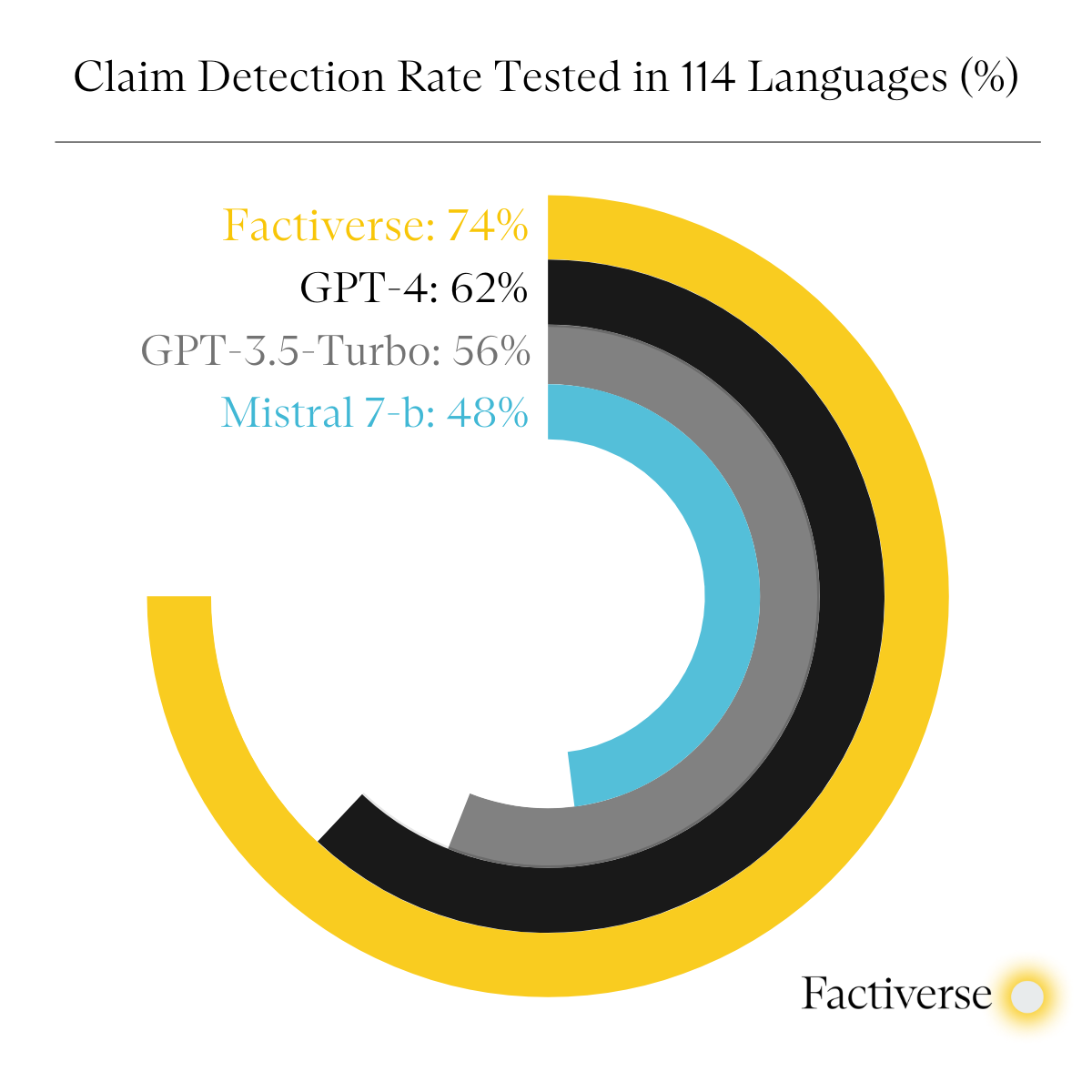Revolutionising Fact-Checking with Factiverse AI Editor
In the era of digital information, combating the spread of misinformation has become a high-priority task for many organisations.
The whitepaper "End-to-end Multilingual Fact-Checking at Scale" by Vinay Setty from the Factiverse team introduces an innovative approach to address this issue.
A comprehensive and end-to-end fact-checking solution in over 100 languages called Factiverse AI Editor. This solution is already outperforming large language models (LLMs) like ChatGPT3.5 Turbo, ChatGPT 4, and Mistral-7b in detecting factual accuracies in textual content.
Factiverse AI Editor:
As presented in the whitepaper, Factiverse AI Editor is an advanced text editor designed to assist professionals in fact-checking and correcting factual inaccuracies in textual content.
The editor is incredibly advanced and supports over 100 languages. It utilises cutting-edge AI models to streamline the labor and time-intensive process of fact verification.
The main components of the Factiverse AI Editor involve query generation, search engine retrieval, credible source filtering, snippet extraction, and deduplication.
1 Check-Worthy Claim Detection:
Factiverse AI Editor identifies sentences in the text that warrant verification, using a proprietary transformer model trained on custom datasets.
The tool classifies sentences into check-worthy and not-check-worthy claims, appealing to the public for verification.
2 Evidence Search:
The system searches for highly relevant sources and articles necessary to verify claims.
It utilises self-hosted language models like Mistral-7b to generate queries and searches multiple sources, including Google, Bing, Wikipedia, and Factiverse's fact-checking database.
3 Veracity/Accuracy To Facts Prediction:
After collecting evidence snippets, the tool predicts the veracity of the identified claims based on majority support from credible sources.
It aggregates predictions for individual evidence snippets and suggests corrections to disputed claims using a language model.
Factiverse Vs Mistral 7b Vs GPT
Factiverse AI Editor vs Other LLMs
The whitepaper provides a comprehensive evaluation of Factiverse AI Editor. It details a testing methodology that had the Factiverse AI Editor go against large language models like GPT-4, GPT 3.5 - Turbo, and Mistral-7b.
The two key performance indicators used in the testing methodology were claim detection and veracity prediction.
Here are summaries of how the Factiverse AI Editor performed against other language models:
Claim Detection Rate
This chart showcases Factiverse outperforming other language models in claim detection when tested in 114 languages.
Claim Detection Rate Tested in 114 Languages (%)
Veracity Prediction Rate
This chart details that the Factiverse AI Editor also outperforms other language models in veracity prediction when tested in 46 languages.
Veracity Prediction Rate Tested in English (%)
Through this research, Factiverse AI Editor proves that it is consistently outperforming other LLM’s claim detection and veracity prediction in English.
It showcases its effectiveness as a tool for detecting factual inaccuracies across multiple languages in textual content.
The Global Misinformation Challenge:
The impact of misinformation on societies worldwide is already being realised. The WEF has said that misinformation is the biggest global risk for the next two years and the fifth biggest risk over the next 10 years (SOURCE). The effects of misinformation, left unchecked, have been projected to erode digital trust and cause severe reputational damage for numerous companies.
There is a need and a sense of urgency to develop robust tools capable of accurately detecting and rectifying factual inaccuracies. This is especially true in the case of low-resource languages. These are spoken languages that lack data that can be used for machine learning or other processing activities. Languages like Vietnamese, Swahili, Thai, and Bengali are examples of such languages.
These are problems that the Factiverse AI Editor can and will solve.
Use Factiverse AI Editor to Check Factual Inaccuracies
The importance of the Factiverse AI Editor is that it is a tool that aims to bridge the gap in fact-checking tools across languages. It highlights the value of fine-tuned language models tailored for specific tasks, showcasing their ability to outperform large language models like ChatGPT and Mistral-7b.
If you would like to try the tool for yourself, click here to claim a free trial of Factiverse AI Editor.
The commitment to addressing misinformation in low-resource languages is crucial for creating more equitable access to accurate information globally.
In a world where the impact of misinformation is growing at an alarming rate, Factiverse’s approach to end-to-end multilingual fact-checking provides valuable insights into the future of fact-checking technology.
More importantly, the Factiverse AI Editor stands out as an effective solution to the global risk of misinformation and establishing digital trust.
If you want to read the full whitepaper by Factiverse CTO Vinay Setty, please click here.





